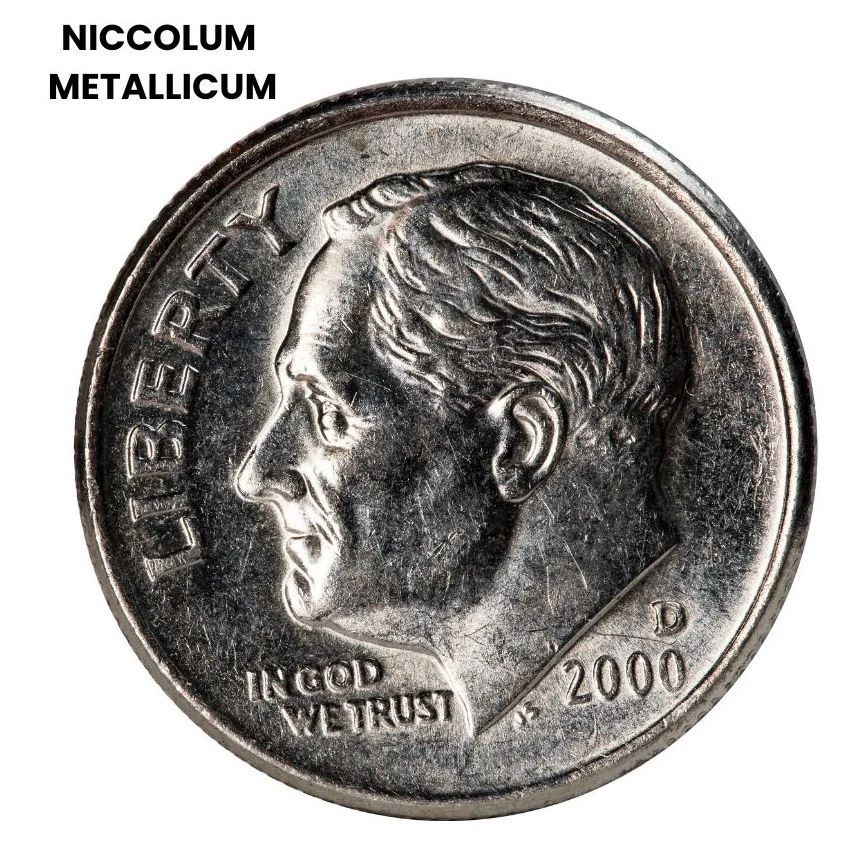Niccolum Metallicum, derived from metallic nickel, is a homeopathic remedy primarily used for various nervous and gastrointestinal issues.
It is particularly suited for debilitated, nervous individuals with frequent headaches, digestive problems, and constipation.
This remedy is known for its efficacy in addressing periodical nervous headaches, nasal catarrh, and acute gastralgia, among other symptoms.

SOURCE INFORMATION
Scientific Classification
- Kingdom: Mineral (Metal)
- Element: Nickel (Ni)
- Chemical Formula: Ni
Origin and Historical Facts
- Origin: Nickel is a naturally occurring metal found in the Earth’s crust.
- Historical Significance: In homeopathy, metallic nickel (Niccolum Metallicum) is prepared as a remedy by potentization, utilizing its therapeutic properties for various health conditions.
DRUG PATHOGENESIS
Niccolum Metallicum affects primarily the nervous system and gastrointestinal tract. It is indicated for:
- Periodic nervous headaches with sensitivity to light (asthenopia).
- Weak digestion and constipation.
- Catarrhal conditions, including nasal catarrh and sore throat.
- Suitable for nervous, literary patients prone to headaches and digestive disturbances.
KEY CHARACTERISTICS
HEAD
- Cracking in cervical vertebrae: Sensation of cracking or popping in the neck vertebrae, possibly indicating stiffness or tension.
- Head pain as if from a nail driven in: Intense, sharp pain in the head, as if a nail is being driven into the skull, suggesting severe headache.
- Pressure on vertex, worsened in the morning and warm rooms: Feeling of pressure or heaviness at the top of the head, aggravated in the morning and in warm environments.
- Migraine starting on the left side: Severe headaches, often beginning on the left side of the head, potentially accompanied by sensitivity to light and sound.
- Twitching of upper lip: Involuntary twitching or spasms of the upper lip muscles, indicating neurological sensitivity or irritation.
NOSE
- Violent sneezing; nasal congestion: Sudden, forceful sneezing episodes with nasal passages blocked due to congestion.
- Catarrh with redness and swelling at the nose tip: Nasal inflammation characterized by redness and swelling at the tip of the nose, often associated with mucous discharge.
- Acute pain at the root of the nose extending to temples: Sharp pain felt at the base of the nose that extends up to the temples, possibly indicating sinusitis or inflammation.
THROAT
- Sore throat on the right side with tenderness; sensitive to touch externally: Pain and tenderness localized to the right side of the throat, worsened by external pressure, suggesting inflammation or infection.
- Feeling of being strangled: Sensation of tightness or constriction in the throat, as if being choked, possibly due to swollen tissues or muscular tension.
GASTRIC
- Empty feeling in the stomach without appetite: Persistent sensation of emptiness or hollowness in the stomach, despite lacking desire to eat.
- Severe stomach pain extending to the shoulder: Intense abdominal pain that radiates towards the shoulder, possibly indicating gastric or digestive tract involvement.
- Thirst and intense hiccough: Strong desire for liquids and frequent, uncontrollable hiccups, indicating digestive disturbance.
- Sour, fetid secretions from molars: Unpleasant, acidic-smelling discharge from the back teeth, potentially indicative of gastric reflux or oral hygiene issues.
- Diarrhea and tenesmus after consuming milk: Loose stools and painful straining after consuming milk, suggesting lactose intolerance or gastrointestinal sensitivity.
FEMALE
- Delayed and scanty menstruation with debility and burning eyes: Menstrual cycles that are late and scanty, accompanied by weakness and burning sensation in the eyes.
- Profuse leucorrhoea aggravated after urination and menses: Excessive vaginal discharge, worsened after urination and menstrual periods, possibly indicating hormonal imbalance or infection.
RESPIRATORY
- Hoarseness: Rough or strained voice due to inflammation or irritation of the vocal cords.
- Dry, hacking cough with chest stitches: Persistent, dry cough accompanied by sharp pains in the chest, indicating respiratory irritation or infection.
- Needs support and must bend over when coughing: Inability to cough comfortably without support, leaning forward to ease discomfort, suggesting respiratory distress.
SKIN
- Generalized itching worse on the neck, not relieved by scratching: Widespread skin itching, particularly severe on the neck, not alleviated by scratching, indicating dermatological sensitivity or irritation.
MODALITIES
- Worse: Periodically (every two weeks, yearly), forenoon, warm rooms.
- Better: Evening.
RELATIONSHIP WITH OTHER DRUGS
- Compare with other homeopathic remedies for headaches, catarrhal conditions, and digestive disturbances.
DOSE
- Third trituration potency is commonly prescribed.
Frequently Asked Questions (FAQs)
What conditions can Niccolum Metallicum treat?
- It is effective for nervous headaches, nasal catarrh, sore throats, digestive issues, menstrual irregularities, and respiratory symptoms.
How does Niccolum Metallicum affect the nervous system?
- It addresses periodic nervous headaches, twitching sensations, and neurological symptoms exacerbated periodically.
What are the main symptoms indicating the need for Niccolum Metallicum?
- Key symptoms include periodic headaches, nasal congestion, sore throat, stomach pains, and menstrual irregularities.
What potency is recommended for Niccolum Metallicum?
- Third trituration potency is commonly used for treating symptoms associated with Niccolum Metallicum.
Meaning of Difficult Words
- Asthenopia: Eye strain or fatigue.
- Gastralgia: Severe stomach pain or gastritis.
- Tenesmus: Straining or painful urge to defecate.
- Leucorrhoea: Vaginal discharge.
